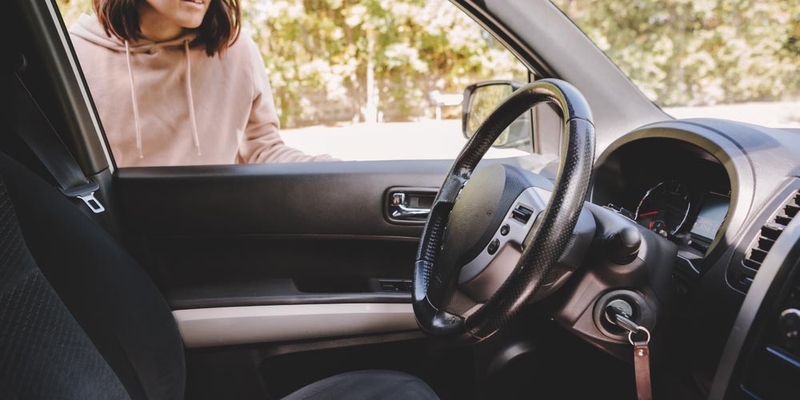
If you are not redirected within 30 seconds, please click here to continue.
Samedi: 10h – 16h HAE

If you are not redirected within 30 seconds, please click here to continue.
If you are not redirected within 30 seconds, please click here to continue.
10 things to look out for when buying a used car from a private seller

Table of Contents
So, you saw an online listing for a used car from a private seller and you want to make an offer. Not so fast.
The decision to buy a car from a private seller should not be taken lightly. The process takes time, preparation, and can be fraught with pitfalls.
To minimize the risk of getting ripped off or scammed, there are some important checks you should always perform before, during, and after viewing the vehicle.
The following 10 steps will help you find a reliable used vehicle at a fair price.
1. Do a VIN and registration check
First things first. You’re going to want to verify the vehicle’s identity. VIN checks give you validated basic information like year, make, model, engine, drivetrain, and where the car was assembled. This helps you verify that the car is exactly what the seller says it is.
VIN checks are easy to access online and they are usually free to look up with services like CARFAX and Transport Canada. It only takes a couple of minutes and should be your first step in protecting yourself against any potential fraud.
You should also request proof that you’re dealing with the vehicle's registered owner. Ask for photo ID and home address, and confirm this information with what’s on the registration. In Ontario, this information will also be included in the Used Vehicle Information Package (UVIP).
2. Complete a stolen vehicle check
Chances are if you find an online listing for a used vehicle, it’s probably not “hot” (as in stolen); car thieves don’t tend to advertise their offerings. But you can’t be too careful, especially if the vehicle price is suspiciously low and the seller is being evasive in answering your questions.
The government of Canada makes doing an online background check on vehicles free of cost. If the vehicle does come up as stolen, be sure to alert the local authorities and do not further engage with the seller.
3. Find out the vehicle’s market price
The big question facing any buyer when considering a used car from a private seller is whether the advertised price is fair. What is a fair price? This is one of the trickiest questions to answer when buying a car because you don’t want to overpay.
You have tools at your disposal to find out what the average price is for the used car you are eyeing up. Two very popular resources for discovering average market prices are the Canadian Black Book and CARFAX Value Range Estimator. Both give you a price range for vehicles based on similar models recently sold in your area. Coming armed with a data-based average price range will help you determine if the asking price is fair.
4. Check the mileage
The old saying “she’s been around the block a few times” is usually code for high mileage. However, higher mileage usually means a lower price, and some cars are built to go the distance, so it’s not necessarily always a bad thing.
That said, you want to know how much wear and tear has been put on the vehicle compared to the price being asked. Around 20,000 kilometres a year is considered standard, so if you’re buying something five years or older — around 100,000 kilometres and up is expected. Anything more should be reflected in the seller’s asking price. If it’s not, you can use it as a bargaining chip to negotiate a lower price.
5. Review the vehicle’s accident and recall history
Has anything been damaged or any parts replaced or updated? Perhaps the car was in a bad collision and has had extensive repairs done. You need to know if the vehicle has had any issues in the past. That’s why nearly every used car in Canada has a vehicle history report.
Much more comprehensive compared to a VIN check, a vehicle history report will provide any history of accidents and service records among other things. You’ll also find vehicle recall information in this report. Transport Canada also has a helpful online database that lets you check the recall history for every make and model since 1970.
Some dealerships and online retailers offer complete transparency with free vehicle history reports, but in a private sale, the buyer or seller will have to pay a fee to download it online. Ask the seller to provide it. If they say no, you can either purchase one yourself or view their reluctance as a red flag and walk away.
6. Do a lien check
When you buy a used car from a private seller the vehicle title will be transferred to you after the sale. You want to make sure the title is “clean,” meaning the seller does not still owe money on the vehicle. Your new car could be repossessed if you don’t take the proper precautions.
You can perform a lien check through a provincial or territorial personal property security search. You will need the VIN, and there could be a fee for the service depending on the province.
Alternatively, the lien check can also be found in the vehicle history report. In some provinces (like Ontario), the seller is required to provide this information as part of the UVIP.
7. Ask to see service records
Ask the owner for any service records pertaining to the vehicle. This information can be found in the vehicle history report, but if this report is not available, request to see the maintenance log. Detailed records are usually a good indication that the owner took proper care of the vehicle and it’s in good condition.
Since the warranty goes with the car and not the owner, it’s a good idea to ask about any existing warranty protection, too. The manufacturer’s warranty usually expires within five years, so if you’re buying an older car, this question is irrelevant. However, the seller might have an extended warranty that could be transferred to you at no extra cost.
8. Do a physical inspection
No one is asking you to put on a pair of oil-stained overalls and get under the car with a wrench. But before you hire a pro to inspect the car, there are a few basic vehicle inspections that anyone can perform to get a quick impression of the car’s general condition.
- Look for any signs of rust or corrosion under the hood, and significant wear and tear on the belts.
- A quick eye test will tell you if the battery has any noticeable signs of damage or corrosion.
- With fluids, look for signs of sludge or discolouration, and check the ground for leakage.
- Examine the upholstery, looking for stains or cigarette burns.
- Check for strange odours from cigarettes, fast food, etc.
- Look for any visible scratches, dents, scuffs, or mismatched paint.
- Look for rust on the undercarriage.
- Are the tires in decent condition or will they need to be replaced soon?
After you do your own inspection, have an experienced mechanic check out the car and identify any potential issues. This will cost you, but it’s not nearly as costly as buying a lemon that needs constant wallet-draining mechanical repairs.
9. Take the vehicle for a test drive
There are lots of things to look out for during a test drive and you have a limited amount of time to listen for any quirks, and quickly evaluate whether you like how the vehicle handles.
You want to buy a car that suits your style of driving. The best way to know is by parking, reversing, and performing other tricky manoeuvres. If possible, you want to see how the vehicle handles on both city and highway roads.
During the test drive, do some quick checks on important things like:
- Seat belts
- Seat adjustments
- Mirrors
- Lights (interior and exterior)
- Infotainment system
It goes without saying, but always ask the seller about any warning or check engine lights that appear on the dashboard.
10. Get a safety inspection and certificate
It varies by province and territory, but the car may need to be certified for roadworthiness at an authorized location before you can register it (which is the case in Manitoba) or put licence plates on it (which is the case in Ontario). Maybe the seller already organized it, but regardless, it’s best to get it done before you agree to the sale.
You’ll also want to get the bill of sale from the seller once the sale goes through.
Once you do, you can get the vehicle registered and insured to start driving. The registration process varies by province. For example, when you buy a used car in Ontario, you will need to register it with ServiceOntario. There you will be provided a vehicle permit and licence plate.
In provinces like Ontario, Alberta, and Quebec, make sure you shop around for the best car insurance rates and find a plan that meets your budget.
Don't waste time calling around for auto insurance
Use Rates.ca to shop around, and compare multiple quotes at the same time.
Get money-saving tips in your inbox.
Stay on top of personal finance tips from our money experts!










